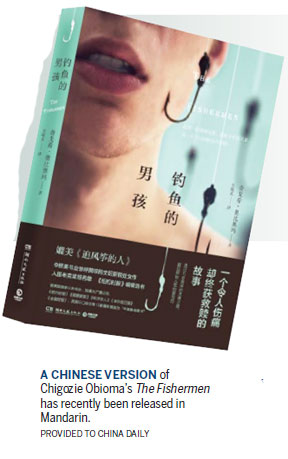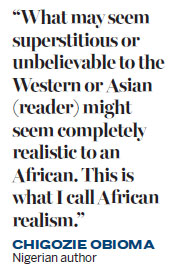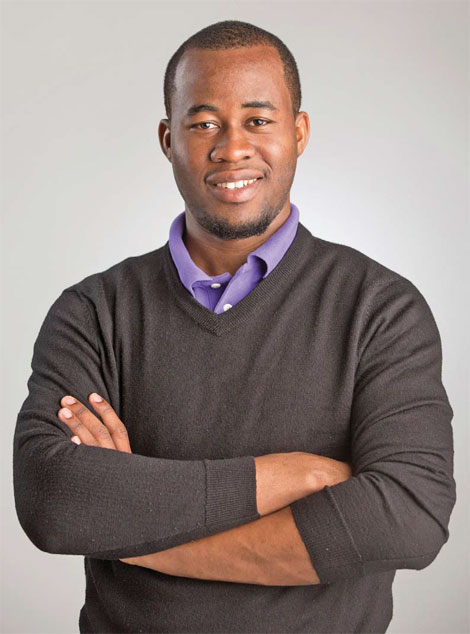Hooked on realism

Nigerian author talks about his debut novel, a tale of brotherly love and murder, which has been released in Mandarin
Chigozie Obioma's favorite Chinese author right now is Yan Lianke, who he says uses "spiritual realism" to represent the pursuit of an invisible truth in his books.
In his debut novel, The Fishermen, the Nigerian writer says he, too, has tried to represent a kind of realism - "African realism", which is something he feels Westerners or Asians may see as superstitious.
| Chigozie Obioma says the African worldview is radically different. Provided to China Daily |
The Fishermen was shortlisted for the 2015 Man Booker Prize and included by the Economist, The Wall Street Journal and The New York Times on their best fiction lists. A Mandarin edition came out this year.
The story is a tragedy about four brothers from a middle-class Nigerian family in the 1990s. It is told from the perspective of Benjamin Agwu, both as a 10-year-old recounting the events in court and as an adult two decades on.
Obioma is one of the best-known African authors in China, but his debut is a difficult read. While the story is clear, there is something beneath the surface that's hard to grasp for people unfamiliar with Nigerian history.
The Agwu family consists of a father, mother and six children (five boys, one girl) who live in Akure. The father, an employee at the Central Bank of Nigeria, is transferred to Yola, a town 1,000 kilometers to the north, leaving his wife and children behind.
Soon, the four eldest boys - Ikenna, Boja, Obembe and Benjamin - start to fish in Omi-Ala, the local river.
The waterway provided food and clean water for the earliest settlers and, as is common in Africa, came to be worshipped as a god. Yet when the European missionaries arrived, everything changed. People became Christians and turned their backs on the river, seeing it instead as a place of evil, and children are forbidden from going near it.
A neighbor finds out about the boys' fishing trips and tells their mother. When the father returns at the weekend, he whips the boys, with Ikenna, 14, receiving the most punishment.

The event changes Ikenna, and when a local soothsayer called Abulu predicts he will be killed at the hands of a fisherman, Ikenna begins to suspect that his brother, Boja, will be the one who fulfils the prophecy.
Despite his mother's best efforts to reassure him, he is consumed with fear. Eventually, the two brothers come to blows and Ikenna is killed. Consumed by remorse, Boja jumps into the family's well and drowns. The two younger brothers then take revenge by killing Abulu. Afterward, Obembe runs away, and Benjamin is sentenced to six years in prison.
The author says he can understand why non-African readers may take issue with the boys' reaction to the prophecy.
"I must say that in Africa, our worldview is radically different," Obioma explains. "What may seem superstitious or unbelievable to the Western or Asian (reader) might seem completely realistic to an African. This is what I call African realism."
Homesick, but inspired
Born in Akure in 1986, Obioma's family bears similarities to the Agwu clan: His father also worked for the central bank, and the family had access to most things, at least on a basic level. He started writing at age 9, but apart from a few short stories, his work largely remains unpublished.
The idea for The Fishermen came from being homesick when he was living in Cyprus in 2009. He says he especially missed his brothers and sisters.
One evening, during a phone call to his father, the author learned that his two oldest brothers, who had been rivals growing up, were drawing closer.
"I started to think about that closeness and what it means to love your brother, and also what if this time never came, what if they never came to understand this love of brother and closeness of family," he recalls. "That reflection brought the idea of a close-knit family that is destroyed."
At the time he had been reading The Great Civilization, in which Will Durant repeats that "a great civilization cannot be destroyed from the outside; it has to come from within". He says the book influenced him deeply.
"I was thinking of what could come from the outside and destroy a family - that is where the germ of the idea came from."

Although dark, disturbing and shocking, "the heart of the book lies in the love between the brothers", he adds.
In a broader sense, the novel is also a comment on the situation in Nigeria in the 1960s.
"The madmen are the English, and the sane ones are the Nigerians," the author writes in the postscript of the Chinese edition of The Fishermen. For him, Abulu represents those who penetrate other people's lives, and create chaos and misery for people just by speaking. The Agwu family, meanwhile, represents an ethnic group in Nigeria.
The African nation gained independence from Britain in the 1960s, but its three main ethnic groups were far from united. Six years later, one of them, the Igbo, led an attempt at obtaining independence for eastern Nigeria, breaking away to form the state of Biafra.
The civil war lasted two and a half years and cost hundreds of thousands of lives.
In that light, the symbolic meaning of the characters in The Fishermen and the inevitable outcome of the brothers' situation becomes clearer.
Contact the writers through yangyangs@chinadaily.com.cn
(China Daily European Weekly 09/30/2016 page19)
Today's Top News
- Japan PM's remarks on Taiwan send severely wrong signal
- Key steps to boost RMB's intl standing highlighted
- Sustained fight against corruption urged
- Xi calls for promotion of spirit of volunteerism
- Xi calls for promoting volunteer spirit to serve national rejuvenation
- Xi chairs CPC meeting to review report on central discipline inspection































